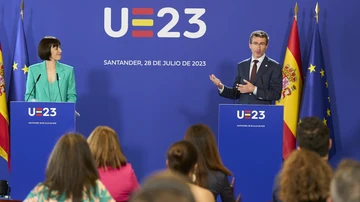Spain presides over the Council of the European Union (EU) since last July 1 and will continue until December 31, 2023. Six months in total that involve a series of events led by our country and that have special relevance as it is the last period of the European legislature. Although it is the fifth time that Spain assumes this position, the European presidency remains unknown to citizens. Because it is important? What tasks does the country you preside over assume?
First of all: what is the Council of the European Union?
The Council of the European Union must be distinguished from the European Council, another different EU institution. The Council of the EU, which is the one presided over by Spain now, represents the governments of each member state. It brings together the ministers of all Member States to adopt European legislation and coordinate their policies.
Together with the European Parliament, the Council is the main decision-making body of the EU. Leading this body is important because, in that period, you have special decision-making power to propose topics to discuss. In this case, they are the Spanish ministers of each branch who preside the meetings during that period, except for the meetings of the foreign ministers, who have a permanent president, the High Representative of the Union for Foreign Affairs and Security Policy (the Spanish politician Josep Borrell in this case).
Its official headquarters are in Brussels and Luxembourg, although informal meetings are held in the country it presides over. Since Spain began, the Ministers of Research have met in Santander, those of Exteriorsand those of Defense in Toledo (August 30) and those of Agriculture in Córdoba (September 5).

The acting Minister of Science and Innovation, Diana Morant, and the Director General of Innovation, Marc Lemaitre, at a press conference after the informal meeting of the Research Ministers of the European Union. | Europa Press
Sánchez recalled that there will be events of the Spanish semiannual presidency in all the autonomous communities to show the cultural wealth and diversity of the country, and to also bring Europe closer to citizens with a multitude of cultural events.
Different organisms are the European Council, which does have a permanent president (Charles Michel at this time) and which is also made up of the heads of State or Government of the 27 Member States of the EU and the President of the European Commission.
Nor should we confuse the Council of the EU with the Council of Europe, another institution outside the European Union and made up of 46 countries, including the 27 of the EU.
Why six months?
The other times that Spain has led the EU Council was in 1989, 1995, 2002 and 2010, also in six-month shifts. But the curious rotating system that this Council currently has was established in the Treaty of Lisbon in 2009. The Member States that hold the presidency collaborate in groups of three, called Trios. The current Trio is made up of Spain, Belgium and Hungary and our country has inaugurated the current 18-month period.
This is another reason why the Spanish presidency is crucial, because it faces the last full period before the end of the legislature that will give rise to the elections to the European Parliament in 2024.
What objectives does the Spanish presidency have?
The challenges of the moment in a Europe that also has a war at its doors are not few. As specified by the President of the Government, Pedro Sánchez, the social agenda, the ecological transition or digital transformation are the key topics that will be covered this semester.
But there is more, how to continue contributing help ukraineconclude agreements with Latin American countries such as Mercosur, conclude the banking union and a reform of the EU’s fiscal rules that allows maintaining healthy public accounts, according to Sánchez.
Close the ninth legislature
The proximity to the European elections means that this semester will be especially focused on closing the proposals underway. “We are at a crucial point, we have to advance different initiatives to take them to the final goal,” Sánchez explained. In total, nothing less than 250 proposals are those that were pending closure at the time of starting the presidency, a third of the total of those raised in the European mandate that began in 2019.
Source: Lasexta
Ricardo is a renowned author and journalist, known for his exceptional writing on top-news stories. He currently works as a writer at the 247 News Agency, where he is known for his ability to deliver breaking news and insightful analysis on the most pressing issues of the day.












